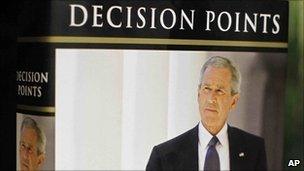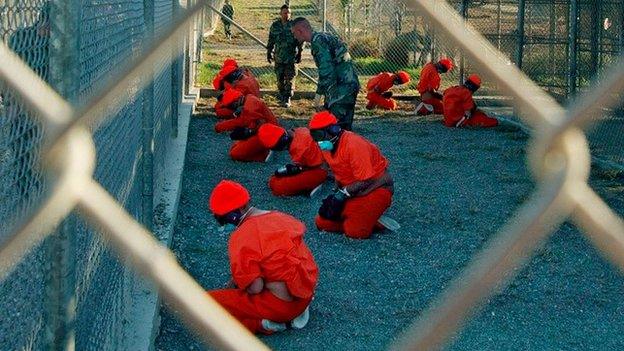Bush defends his controversial White House policies
- Published

Bush's memoirs come two years after he left office
Former US President George W Bush has defended some of his most controversial decisions, in his first television interview since leaving office.
He told US network NBC, external that use of the interrogation technique waterboarding - simulated drowning - had prevented terrorist attacks and saved lives.
Mr Bush, who is publicising his memoir Decision Points, said the invasion of Iraq in 2003 was not wrong.
History would judge him a success, he added, but he would be dead by then.
"I just didn't want to get out there anymore," he told NBC's Matt Lauer of his absence from the media since he left the White House in January 2009.
"I didn't want to get back into what I call 'the swamp'," he said.
Waterboarding 'legal'
On the interrogation of terror suspects, he said his legal adviser had told him that the use of waterboarding on several Guantanamo inmates was legal.
"He said it did not fall within the anti-torture act. I'm not a lawyer. But you've got to trust the judgement of people around you, and I do," Mr Bush said.
"I will tell you this: using those techniques saved lives. My job was to protect America. And I did."
Human rights groups have hit out at Mr Bush's defence of the interrogation technique. Steve Ballinger, from Liberty, said Mr Bush was wrong to say waterboarding as justified "because torture is illegal under international law".
"It is completely banned in all circumstances by the United Nations convention against torture and the US is a state party to that so it should not be doing it," he added.
Mr Lauer asked Mr Bush of the "sickening feeling" he describes in Decision Points every time he thinks about the failure to find weapons of mass destruction in Iraq after the 2003 invasion that toppled Saddam Hussein.
"Was there ever any consideration of apologising to the American people?" Mr Lauer asked.
"I mean, apologising would basically say the decision was a wrong decision," Mr Bush replied. "And I don't believe it was the wrong decision."
He said it might be some time before history is able to judge his presidency.
"I hope I'm judged a success. But I'm gonna be dead, Matt, when they finally figure it out," he said.
Economic woes
In his memoir, Mr Bush admits the economic woes he left to his successor, Barack Obama, were "one ugly way to end a presidency".
But he rejects accusations that the bailout of the banks, known as Tarp - the Troubled Asset Relief Program - was a waste of public money.
"Tarp sent an unmistakable signal that we would not let the American financial system fail," he asserts.
But in the final months of his presidency, he still hoped the United States might avoid a recession, he writes, even as "the house of cards was about to come tumbling down".
He defends his economic policies against charges by fiscal conservatives - including the Tea Party movement - who say he squandered the surplus left by the outgoing Clinton administration in 2001.
"Once the recession and 9/11 hit, there was little surplus left," Mr Bush writes.
In the television interview, Mr Bush also revealed he fell out with his vice-president, Dick Cheney, in a row over whether to pardon Mr Cheney's top aide.
Mr Bush refused to pardon Lewis "Scooter" Libby, who was convicted of perjury and obstruction in connection with the leaking of the identity of a CIA spy.
But Mr Bush said his friendship with Mr Cheney had recovered.
- Published10 December 2014

- Published9 November 2010
- Published8 November 2010
- Published3 November 2010